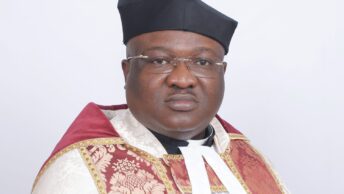By Ven. David C. Nwanekpe
It has become increasingly necessary to speak about certain disturbing trends within the Nigerian Church—particularly in the Anglican Church of Nigeria. My reflections have drawn attention and controversy, not because they are false, but because they expose uncomfortable truths we have long chosen to ignore. What was intended to be a theological and cultural critique has regrettably turned into an avenue for abuse, especially from those who should know better—fellow clergy, evangelists, and laity alike.
I am deeply worried that we have become a church where truth is demonized, and respectful academic discourse has been replaced by insults and mockery. In my inbox, I have received numerous messages filled with disrespect and personal attacks simply because I expressed an opinion rooted in experience and education. It appears that many Nigerians are unable to engage in healthy dialogue or theological inquiry without resorting to insults. Sadly, when I check the profiles of many of my critics, I find titles like “Reverend,” “Evangelist,” or “Youth Leader.” What a shame.
Leadership in the Western Church vs the Nigerian Church
Let me restate my earlier point. The Western Church—be it Anglican, Catholic, or otherwise—may not engage in revivalist or deliverance-centered spirituality like the Nigerian Church does, but they are models of order, discipline, and respect for leadership. When a bishop retires or dies in the West, there is no drama, no politicking, no campaign of slander among clergymen vying for succession. The process is institutionalized, and everyone knows the rules.
In Nigeria, however, we have made clerical promotion a do-or-die affair. Many clergymen would do anything—including betrayal, manipulation, and outright dishonesty—to ascend to the office of bishop, canon, or archdeacon. The Church has become highly politicized, and sadly, even among our laity, the spirit of reverence and order is fading fast.
The Culture of Sycophancy and Silent Betrayal
It is painful to note that many clergy who appear to applaud truth in private are the same ones attacking it in public. They come to my inbox commending me for my boldness, yet go to the comment section to throw stones. This is sycophancy at its worst. It has overtaken the Church and is robbing us of the courage to confront ourselves honestly.
We must ask: Why are we so uncomfortable with truth? Why do we crucify those who challenge us to rethink our assumptions? When did we become so intolerant of academic and theological engagement?
Cultural Practices Are Not Always Doctrine
Much of what we consider “Anglican practice” in Nigeria is in fact not Anglican at all—it is cultural. Take, for example, the burial of clergy. Someone once argued with me that “priests must be buried in the church,” without understanding that in Western contexts, churches don’t even have cemeteries. In the U.S., the U.K., and other parts of Europe, cemeteries are state-regulated and separate from church compounds.
In many cases, the clergy are buried in public cemeteries, and the officiating ministers do not carry the coffin or jump into the grave. That duty is handled by professionals—undertakers. In Nigeria, however, the cultural expectation that “umunna” (kindred) must dig the grave and lower the coffin has been imported into church practice. It is not in the Anglican liturgical manual. It is not found in the Canons. It is simply a cultural practice that our forebears permitted due to societal norms at the time.
The idea that a clergy must carry the body of another clergy into the grave as proof of love is neither biblical nor liturgical. If that were so, does it mean that Western clergy do not love one another because they do not do the same? Certainly not. We must stop elevating culture to the level of doctrine.
A Global Church with Diverse Expressions
The Anglican Church is not a Nigerian Church—it is a global communion spanning over 165 countries. Practices vary based on context, legality, and culture. For instance, in Western countries, Anglican and Catholic churches often borrow from one another’s hymnody and liturgy. In some Catholic masses, you’ll hear Anglican hymns sung with reverence. But in Nigeria, we draw lines of division even in our music. We act as if we must hate what the other denomination practices. This denominational tribalism is harmful and far from the spirit of Christ.
Time for the Church to Reflect
This article is not an attack on the Church. It is a prophetic cry for self-examination. As a priest who has served in both Anambra and Imo States, I have seen clear differences. The Anglican Church in Anambra has a more organized structure, greater regard for clergy, and a more charitable spirit. In some other states, however, clergy are treated with disdain—as though they are beggars who must earn their respect by pandering to the powerful.
The problem is not just our bishops or clergy; the laity must also take responsibility. A people that no longer honor their prophets will find it difficult to receive a blessing. Let us return to healthy conversations and rebuild the broken walls of mutual respect, theological integrity, and ecclesiastical order.
Conclusion
Let us engage, not insult. Let us reason, not revile. Let us learn, not lash out. The future of the Nigerian Church depends on our ability to speak truth in love and to correct our errors in humility. This is not just about burial rites or promotion politics—it is about reclaiming the soul of the Church from deception and disorder.
The Church must rise again—not in noise, but in truth.








